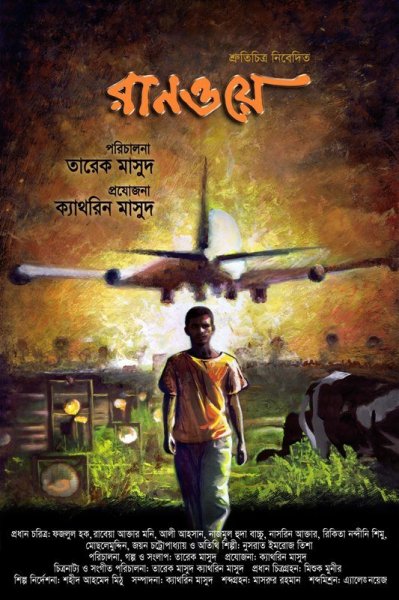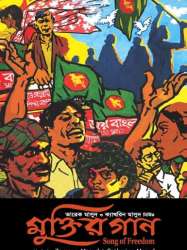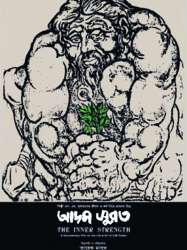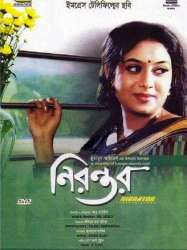Runway is a Bangladais film of genre Drama directed by Tareque Masud with Jayanta Chattopadhyay
Runway (2010)

If you like this film, let us know!
Runway (Bengali: রানওয়ে) is a 2010 Bangladeshi drama film directed by Tareque Masud.
Synopsis
Ruhul, a young frustrated boy lives in a small hut near an international airport.Actors

Jayanta Chattopadhyay
(Uncle)

Nusrat Imroz Tisha
(Selina)
Comments
Leave comment :
Suggestions of similar film to Runway
There are 15 films with the same actors, 7 films with the same director, 69100 with the same cinematographic genres (including 9003 with exactly the same 2 genres than Runway), to have finally 70 suggestions of similar films.If you liked Runway, you will probably like those similar films :

The Clay Bird (2002)
, 1h34Directed by Tareque Masud
Origin France
Genres Drama
Themes L'adolescence, Films about education, Films about children, Films about religion, Films about Islam, Films about school violence
Actors Jayanta Chattopadhyay, Rokeya Prachy
Rating83%





The film is set against the backdrop of unrest in East Pakistan in the late 1960s leading up to the Bangladesh War of Liberation. In this setting, a small family must come to grips with its culture, its faith, and the brutal political changes entering its small-town world. Anu, a young boy, is sent off to a madrasah by his unbendingly devout father Kazi. Anu's younger sister falls ill and dies because of Kazi's refusal to use conventional medicine. While at the madrasah, Anu befriends Rokon, an eccentric misfit in the rigorous religious school, who is forced by the teachers to undergo an exorcism by ducking in the freezing river to cure himself.

Homeland (2005)
, 1h25Directed by Catherine Masud, Tareque Masud
Origin Bangladesh
Genres Drama
Actors Sara Zaker, Jayanta Chattopadhyay, Rokeya Prachy
Rating76%





Ontorjatra (literally meaning "inner journey") is an Bengali intimate exploration of the complex issues of dislocation and identity in a diasporic world. After 15 years in the UK, Shireen and her son Sohel return to their home in Sylhet, Bangladesh for the funeral of Sohel's father. For Shireen the homecoming allows her to make peace with her ex-husband and his family, for Sohel, the journey allows him to connect with a family and a "homeland" he has never known.

Words of Freedom (2012)
, 1h20Directed by Catherine Masud, Tareque Masud
Origin Bangladesh
Genres Documentary
Rating84%





Muktir Katha is a film about the liberation struggle of 1971. The film is an archive of the ways in which ordinary people fell victim to genocide, rape and other atrocities. The struggle still ranging in the countryside, and struggle for a more just and democratic society. The combined footage shot used in the film was taken from American film maker Lear Levin.

Song of Freedom (1995)
, 1h18Directed by Catherine Masud, Tareque Masud
Origin Bangladesh
Genres War, Documentary
Rating91%





In 1971 the people of East Pakistan (now Bangladesh) waged a bitter war of liberation against West Pakistan, which ended in December in 1971 with the foundation of the state of Bangladesh. The film Muktir Gaan is an special and rear archive of footage of this war. Firstly the footage taken by American filmmaker Lear Levin shot of a group of young musicians and actors who at the time travelled through the country with battle songs and political puppet shows. The film follows the group not only during their performances for refugees and guerillas but also during their travels, which has produced many melancholy pictures. Levin's material is available for the first time thanks to two filmmakers from Bangladesh who, being discontent with the present regime, wanted to remind the Bengal people of the initial motives of the war of liberation: freedom and democracy. Despite opposition by the government, the film was screened in Bangladesh where it was a resounding success.

The Inner Strength (1988)
, 54minutesDirected by Tareque Masud
Origin Bangladesh
Genres Documentary
Rating85%





Adam Surat is the first film of Masud. It is a documentary about Bangladeshi painter Sheikh Mohammed Sultan (well known as "SM Sultan"). Masud started the film in 1982 and completed after seven years later. By that time, he had met and married the Chicago-born Catherine Shapere (wel known as Catherine Masud), with whom he formed a close working relationship still death.

Mental (2016)
Origin Bangladesh
Genres Drama, Thriller, Romance
Actors Shakib Khan, Tanjin Tisha, Achol Akhe, Nusrat Imroz Tisha, Moushumi Hamid, Misha Sawdagor
Rating48%





An underworld mafia steals valuable mineral resources and sell them over to international crime organization . Simi (Nusrat Imrose Tisha); a news reporter finds out and exposes the whole criminal chain to the media, despite all threats from them. An unknown, mysterious but affectionate and intimidating man comes up to help, The story revolves around revealing the true identity of him and his link to the Underworld.

Kittonkhola (2000)
, 1h36Directed by Abu Sayeed
Origin Bangladesh
Genres Drama
Actors Raisul Islam Asad, Jayanta Chattopadhyay, Tamalika Karmakar
Fair means happiness and festivity. But amid this festivity, there are people with their misfortune & fateful life. Shonai, Boshir, Dalimon, Rustom, Bonosribala, Chayaranjan are amongst these people and 'Kittonkhola' is their tale. Rural culture, festivities contrast against the gross reality of their life struggle. This harsh reality forces Bonosribala commit suicide. Shonai, Boshir, Chayaranjan, Rustam are baffled by their profession. Darkness looms around them.
 Connection
Connection
